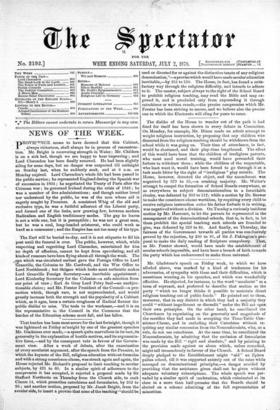That burden has been most severe for the last fortnight,
though it was lightened on Friday se'nnight by one of the greatest speeches Mr. Gladstone ever made,—a speech quite marvellous in its tact, its generosity in the explanation of hostile motives, and its argumenta- tive force,—and by the consequent vote in favour of the Govern- ment view. After a week of debate, after the examination of every secularist argument, after the speech from the Premier, in which the keynote of the Bill, religious education without formulas and with a strong conscience-clause, was struck again and again, the House rejected Dlr. Richard's proposal to limit teaching to secular subjects, by 421 to 60. In a similar spirit of adherence to the compromise it has accepted, it rejected a proposal made by Sir Stafford Northcote on Thursday from the Church side, to omit Clause 14, which proscribes catechisms and formularies, by 252 to 95; and another motion, proposed by Mr. Jacob Bright, from the secular side, to insert a proviso that none of the teaching "should be
used or directed for or against the distinctive tenets of any religions denomination,"—a proviso which would have made secular education inevitable,—by 251 to 130. The House, in fact, has found a satis- factory way through the religious difficulty, and intends to adhere to it. The master, subject always to‘the right of the School Board to prohibit religious teaching, may read the Bible and may ex- pound it, and is precluded only from expounding it through catechisms or written creeds,—the precise compromise which Mr. Forster has been striving to secure, and we believe also the precise one to which the Electorate will cling for years to come.






























